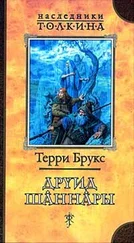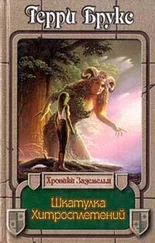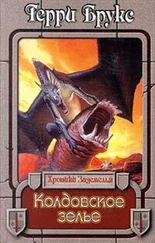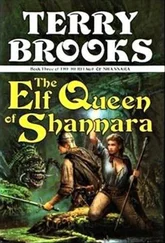«Go where?» He was suddenly afraid. He wasn't sure if he was afraid for her or for himself, — he only knew that he didn't want to be separated from her. «Why do you have to go?»
«So that you can be alone. So that you can do what you came here to do.» Her smile was quick and dazzling, lighting up her face in a way that rendered her instantly beautiful. «The aeriads are going to show me what they look like. They brought me here so that I could see them. I won't be long.»
He stared at her helplessly. «I don't want you to leave.»
Her eyes shifted again, searching the space between them, making it seem as if she were trying to find a way to reach him. «You came to find the tanequil, Pen. You have done so. Make something good come out of that. Find what you need to help your aunt.»
She hesitated a moment longer, then turned away. «I am coming," she said to the air, to something only she could hear. Her head lifted slightly. «Good luck, Pen.»
He watched her disappear into the trees, sylphlike, a shadow quickly lost in the changing mix of light and dark, swallowed whole.
«Good luck," he echoed back, and was alone.
He stood motionless in front of the tanequil for a long time, unsure of where or how to begin, of what to do. The tree would give him one of its branches, if he could find a way to persuade it to do so. The branch could be shaped into something called a darkwand, if he could figure out how. The darkwand would give him access to the Forbidding and allow him to find and retrieve his imprisoned aunt and bring her home again, if he could reach Paranor and pass through the portal created by the potion called liquid night.
If. That word was everywhere. It loomed all about him like an impenetrable wall.
What should he do?
He waited some more, half hoping that the tree would try to communicate with him, that it would take the initiative and show him a way to speak with it. But after standing in front of it for what seemed an interminable amount of time, he gave up hoping. The effort to communicate would have to come from him. He was the supplicant, — he was the one who was going to have to find a way to break through.
He had communicated with the aeriads just by speaking aloud. Would that work with the tanequil, as well?
«My name is Penderrin Ohmsford," he said. «Can you understand what I am saying?»
He felt foolish speaking that way, and he knew as soon as the words were out that there wasn't going to be any response. The tanequil was different from the aeriads. He was going to have to find a different way of speaking to it.
He walked up to the tree and placed his hands on its bark, running them slowly over the hard, rough surface. He was surprised at the warmth he found there, a pulsating heat that radiated outward to spread through his own body. He kept his hands in place as the heat entered him, thinking that might be the beginning of a way to connect.
But nothing more happened.
He took his hands away, staring upward into the thick nest of intertwined limbs. The orange–tipped leaves shimmered in the moonlight overhead, a rippling that reminded him of a sunset's glow on the surface of the Rainbow Lake. Rustling sounds emanated from that shimmer, soft and gentle, and he reached for them with his senses, drawing them in, trying to sort them out and make them into words.
But nothing revealed itself.
He moved back again, gaining some distance, hoping that by doing so he might also gain some perspective. But as he walked slowly around the tanequil, studying its shape, he began to doubt that such a thing was possible. From every angle, the tree appeared the same—ancient and huge, a knotted enigma a boy could never hope to untangle. It was a tree, and as such he understood some little bit about it. But it was a tree of such immensity—of size and shape and age and immutability, of innate intelligence and deep understanding—that it defied him. He recognized its power, but he could not begin to come to terms with it. The longer he tried to decide how it might be done, the more certain he became that it couldn't. The tanequil was too remote, too foreign, and too impenetrable for anyone possessed of less magic than a Druid.
Khyber, he thought, would be better suited for this. He wished suddenly that he had agreed to let her come.
But that was ridiculous. It wasn't Khyber who had been sent by the King of the Silver River. He was the one who had been told that he could find a way to communicate with the tree.
He sat down, crossing his legs before him, resting his chin in his hands, staring at its mottled trunk, and trying to think the problem through. There had to be a means for doing so. He might not know what it was yet, but he should be able to find it if he just thought about it long enough. Communication with living things came about in all sorts of unexpected ways. He had discovered that over the years, — he knew it to be true. So there was a way to communicate with the tanequil too. There was a way to understand it and to make it understand him.
How do trees communicate?
He had no idea. Until then, he had never heard of one that did. Save for the legendary Ellcrys, when it spoke with the Chosen of the Elven people. But the Ellcrys was formed from a human who had willingly agreed to be transformed into a tree. So there was human nature buried somewhere deep within the Ellcrys. He wasn't sure the same could be said of the tanequil. He knew nothing of its history, nothing of how it had come into being. He could not presume that there was anything human about it.
He must find another way, then. It was a tree, and, as such, a plant. What did he know of plants and their relationship with the world? They were alive and took their nourishment from the soil. Some, like the tanequil, were very old, and because they could not move, they had to be very patient. They had endless amounts of time to think, and so they could reason in ways unknown to humans, who were never in one place long enough to give themselves over to reasoning as trees could.
He sighed, staring up into the branches. He was imbuing the tree with human characteristics. Should he be doing that? Did the tanequil think? Did it reason? Could it understand such concepts as patience? Did it do more than root and nourish as the eons passed and the world changed about it?
He thought for a time about the ways in which he understood other living things. Birds and animals he understood from their calls and cries, from the way they moved or didn't move. Insects communicated in much the same way, but without thought. Grasses and flowers possessed limited communicative skills, all in the form of instinctual responses to heat and cold, to wet and dry. Days earlier, in the Klu Mountains, he had read the responses of lichen to the sun's movement by touch …
He stopped himself. Would touch work here? He had tried placing his hands on the tanequil, but its bark was like an armor that protected it from the elements, designed specifically to shield it. It didn't take in nourishment or produce responses to the elements through its bark.
It did those things through its roots.
He stared at the tree. Was that the way to communicate with it— through its roots? How in the world was he supposed to do that, especially when those roots were buried dozens—perhaps hundreds—of feet underground? The prospect of digging down to find them seemed ridiculous. Surely that wasn't what he was intended to do if he wished to communicate with the tree.
If Cinnaminson were there, she might be able to offer a different perspective. In her blindness, sometimes she saw things more clearly than he did. He still didn't know why she had been ordered to leave him alone even though the aeriads had been so specific about her coming with him. Frustration and irritation warred with each other as he thought about it.
Читать дальше











